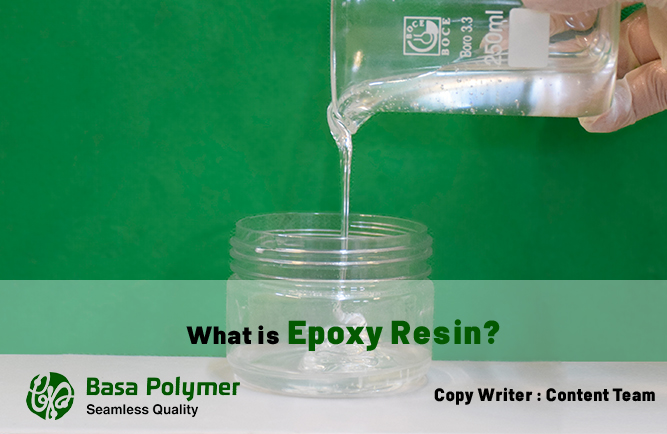What is epoxy resin? Although epoxy resins have been around since the early 1890s, their use has been popular since the early 1950s. Epoxy resins have attracted the attention of many scientists due to their outstanding mechanical properties, high adhesion strength, good thermal resistance, and high electrical resistance, and are widely used in various applications such as coatings, electronic products, adhesives, fiber-reinforced composites, and industries. The final properties of the cured system is determined by different factors such as the type of epoxy resin, curing agent, and the curing process. Therefore, getting to know epoxy resin as well as possible, and how to achieve the required final properties is the first step in working with epoxy resin.
In this article, we are going to introduce epoxy resin and its types, its characteristics, etc.
What is epoxy resin?
Epoxy resin refers to a type of reactive prepolymer containing epoxide groups. These resins react with the presence of catalysts or with many reagents such as amines, phenols, thiols, etc., and after creating crosslinks, they become a hard and rigid polymer.
Epoxy resin has many uses because it is a durable material and can be used with different materials such as cement, wood, stone, or metal. Epoxy resins have higher mechanical properties and more thermal and chemical resistance than other types of resins.
Many people who hear or read about epoxy resin for the first time ask themselves the question, what is epoxy resin? Or what is the use of epoxy resin?
These questions can be answered by referring to their special properties. Epoxy resins include a wide range of properties and characteristics, which depend on the type of hardener, resin, and formulation used. However, depending on the manufacturer and product, it may take up to a week to reach its final properties. However, once the curing process is complete, the following final properties are considered for almost all products.
Properties of epoxy resin
Depending on the purpose and application, different curing systems can be considered for curing epoxy resin. Each combination would lead to different properties.
| • Very high wear resistance
• Moderate impact resistance • low shrinkage after liquid to solid • Good UV resistance (not all epoxies) • High adhesion to wood, metal, stone • Moisture resistance • High thermal resistance • Electrical insulation • High acid resistance, etc. |
Two-component epoxy resin
Two-component epoxy systems, as their name suggests, consist of two components. The first component is a low molecular weight epoxy resin, and the second is a hardener or catalyst. Two components should be mixed in a certain proportion, according to the manufacturer’s instructions. to achieve their final properties after a certain period. If the mixing ratio of the two components does not comply with the instructions, the system will not cure even if more hardeners than the specified amount are used.
Single-component epoxy resin
One-part epoxy is a prepolymer pre-mixed with the appropriate amount of catalyst or hardener that reacts and polymerizes only when exposed to heat or UV light. One-part epoxy compounds are designed to eliminate waste and speed up productivity while reducing concerns about mix ratio and pot life. These systems have outstanding performance characteristics, long durability, and ease of use. These compounds are com used in electronics, aerospace, medicine, electricity, automotive, oil/chemical processing, and optical industries.
Also, checking the amount of viscosity and pot life is one of the important factors that must be considered before buying epoxy resin, which is discussed below.
What is the use of epoxy resin?
Today, epoxy resins include a wide range of applications and are used in the design of many products in different fields. Due to their high strength and excellent adhesion to various surfaces, these resins are widely accepted in various applications (coatings, electrical resins, casting, composites, etc.).
Below are some of the applications of epoxy resin in decorative, industrial, and construction sectors:
What is the application of industrial resin?• Epoxy flooring with different capabilities (antistatic, antibacterial, etc.) • Epoxy flooring with different capabilities (antistatic, antibacterial, etc.) • Multipurpose adhesives• Carrier in cement and mortar• Rigid foams • Non-slip coatings • Solidification of sand surfaces in oil drilling • Industrial coatings • Plastics reinforced with fibers • Sealing the concrete surface • Structure matrix in the aerospace industry • Quick repairs with special UV resin • Waterproof sealants for garage floors • Resin as coating or gel coat for boat building |
What is the use of resin in art?• 3D flooring • Epoxy resin and wood • Making rhinestones • Resin art pictures • Geode resin and resin Petri dishes • Resin table and furniture • Abstract painting epoxy resin • Serving dishes • Closing wood pores or polishing it |
Also read:
Installation of epoxy flooring
In choosing the epoxy resin system, the point that should be considered is which one is more suitable for our desired project.
Several factors affect the choice of the epoxy resin system. For example, the antibacterial feature of epoxy flooring for use in hospitals or its acid resistance feature when exposed to acidic corrosive agents. But for general applications, the important issue is whether the viscosity and curing speed of the epoxy system can meet our needs well.
Low-viscosity epoxy resin
Viscosity describes the fluidity of liquids. Accordingly, when a liquid is fluid, it has a low viscosity. So if you need a fluid material, you should buy a low-viscosity resin. Air bubbles are also easily removed from these systems. Low viscosity can be important for some applications such as:
- Mold casting
- Production of epoxy resin ornaments
- River design resin tables
- Filling cracks and holes in wood etc.
High-viscosity epoxy resins
The viscosity of these resins is almost similar to honey, and they are less fluid. These types of resins can be used in making works of art, resin and geodes, resin jewelry, epoxy containers, and surface sealing.
In the case of highly viscous resins, the manufacturer’s instructions on the coating layer thickness limit for each step should be taken seriously. The higher the viscosity of the used resin, the more difficult it will be for air bubbles to rise and escape.
Read more:
Viscosity test
Epoxy resin
Epoxy resins include a wide range of properties. Various properties, including high mechanical strength, long-term durability, good thermal resistance, thermal insulation, etc., have made it suitable for various construction and industrial applications.
Epoxy resin curing systems are mainly available in the market in two forms, two-component and one-component. In two-component systems, a hardener with an active functional group is needed, and in single-component systems, heat or UV light is needed for hardening. Single-component systems are primarily designed to speed productivity and reduce concerns about mixing ratio and pot life.
In addition to the curing system, the viscosity of the epoxy resin is another effective parameter in epoxy resin work projects that should be considered. Accordingly, before choosing the resin, it is necessary to pay attention to its type and relevant characteristics.
This article was a part of the comprehensive article “Introduction to Epoxy Resin: Properties, Applications and How to Work with Epoxy Resin” compiled by BASA Polymer’s research and development team.


